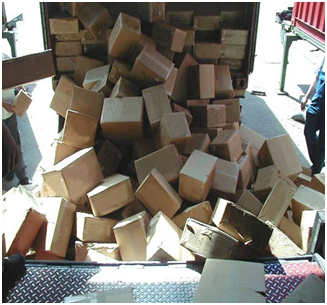

Have you ever received a call from the client to have complaint of the cargo been damaged? Well, it is the face loss moment for the vendor. It is more frustrating when you see it in an unusable state. Now, you are faced with all the problems in the world i.e., upset client, damaged cargo, and loss of significant amount for replacing the goods or for repairs.
It is a definite scenario that no one wants to be in. But you may avoid and even prevent damaged cargo by having some guidelines in your mind.
Here is the listing of the cargo damage guidelines and ideas.
Protection of Cargo against These Five Common Damages:
1. Physical Damage: When you own anything, you must know its weak points and precautionary rules as well. Cargoes are mainly damaged due to dents, bumps, drops, and cracks, and you may prevent it by having the right setup and tools along with it.
• Usage of Right Container: Make sure that you are having the proper container to hold the shipments. Mark it with maximum weight allowances without any damage. Secure the cargo within it and if you are having any doubt find the surveyor for help.
• Follow VGM Requirements: Do not fail to mention the verified weight of the cargo so that you are not risking both human and cargo lives. Load belowspecified weight limit so that the shipment can safely be transported without any damage.
• Use Bracing Aids in Heavy Materials: If you are loading heavy stones or quality materials like granites, install bracing aids for easy transportation.
There are still many available options for protecting the transported cargo from unexpected and sudden physical damage.
2. Water Damage: It is the major concern to keep the cargoes dry & safe till they reach the destination port. You should follow up with these important tips.
• Consider the Shipping Route: It is a genuine solution to take precautions. You should mention this rule with climatic concerns as it may damage the inside portion due to condensation of the sealed packets.
• Manage the Watertight Protection: The rubber seal and doors gaskets should provide significant protection against the occurrence of any leakage. Ensure you end up getting the dry cargoes.
• Include Added Water Protections: Use of ventilated containers or anti-humidity materials may do the trick.
3. Contamination: You need to prevent contamination damaged by separating both solid and liquid bulk cargos.
• Solid Bulk: Tobacco, nuts, fabric, and solid materials naturally decompose as rust and odour contamination phenomenon. Make some arrangement to separate and brace the packages. You may put up special features as per the requirements of Cargo Dunnage Bags Manufacturers in Malaysia.
• Liquid Bulk: First have the clean tank as per the ISO certification rule. Put on the certificate that indicates the details of tank cleaning procedures in recent times. Tank inspection is also needed to mark your cargo’s safety against any contamination. Choose the right tank to keep the foods, essential chemicals, and other liquids in a safe place.
Markdown all the chances for cargo contamination via a liquid tank. It happens even after thorough cleaning of cargo tanks. Check for more inspection and compatibility to get rid of these potential problems.
4. Refrigeration Related Damages: While you are having refrigeration to preserve the materials of cargo, you also need to have essential steps for safe shipments. You must monitor the pre-cooling phenomenon to check the improved packaging of the goods.
Take care of reefer units because their safety will involve overall cargo’s safety. When you are loading the items, kindly turn off trailers and reefers. It would not bring unwanted ice loading and keep the reefer clean.
Hence you get some important details about the safety and prevention of damaged cargo shipments. If you are interested to upgrade your knowledge, you will search for more related articles.